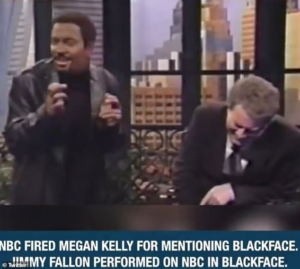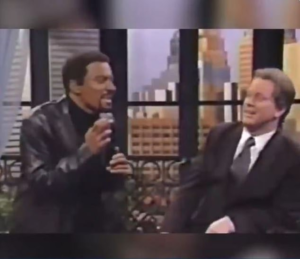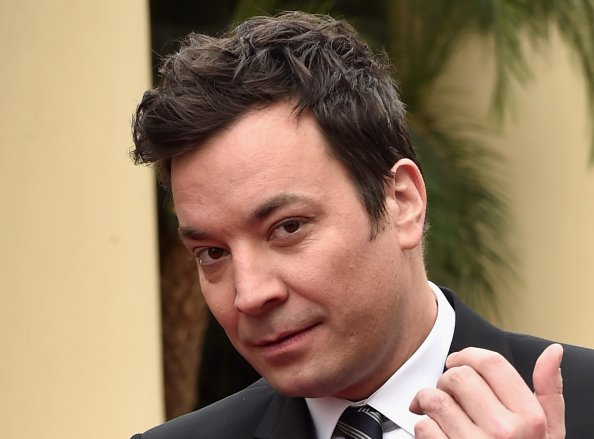Jimmy Fallon is currently facing backlash for his involvement in a racially insensitive skit from twenty years ago, during the early stages of his career. The controversy stems from Fallon’s decision to use blackface as part of a Chris Rock impersonation while he was a cast member on Saturday Night Live.

Since the emergence of the clip depicting Fallon in blackface, he has issued a public apology, acknowledging the inexcusable nature of his actions. However, critics argue that Fallon’s apology may not be enough to salvage his career, particularly in today’s climate of heightened sensitivity towards racially charged issues.
The timing of Fallon’s apology, coinciding with the resurfacing of the blackface video, has led many to question the sincerity of his remorse. Some view Fallon’s apology as an attempt to mitigate the damage to his reputation and career, rather than a genuine acknowledgment of the harm caused by his actions.

Despite Fallon’s apology, calls for accountability and consequences persist, with some demanding that he be fired from his prominent hosting position. Comparisons have been drawn to previous instances where individuals faced severe repercussions for racially insensitive remarks or behavior, leading to questions about consistency in applying consequences.
However, there are differing opinions on whether Fallon’s career should be completely derailed as a result of his past actions. While some argue for cancellation, pointing to the gravity of using blackface and the need for accountability, others believe that Fallon’s actions, though reprehensible, occurred two decades ago and should not necessarily define his entire career trajectory.

Ultimately, the debate surrounding Jimmy Fallon’s past use of blackface highlights broader conversations about accountability, forgiveness, and the consequences of racially insensitive behavior in the entertainment industry.
The Bigger Picture: Entertainment Industry Responsibility
Jimmy Fallon’s situation brings to light a broader conversation about responsibility in media, social accountability, and representation in entertainment. Public figures, including actors, comedians, and talk show hosts, often set the tone for what audiences consider acceptable behavior and humor. As society becomes more aware of issues related to race, gender equality, and representation, entertainment figures must be mindful of their actions and ensure that their content aligns with contemporary social values.
Key Issues to Address
- Representation and Diversity in Media
There’s a call for greater diversity both on-screen and behind the scenes, ensuring that writers, directors, producers, and showrunners come from varied backgrounds. Representation is crucial in shaping media narratives that are more inclusive and authentic. - Comedy Boundaries and Sensitivity
Comedians and entertainers face a challenge in balancing humor with sensitivity, ensuring that comedy does not rely on harmful stereotypes or jokes that can offend marginalized communities. Fallon’s case highlights the importance of understanding social responsibility, as comedy should promote laughter without dehumanizing or offending others. - Public Figures’ Accountability
Fallon’s experience underscores the need for public figures to acknowledge their past mistakes, apologize sincerely if needed, and commit to positive change. This accountability not only rebuilds trust but also provides an opportunity to use their influence for social good, education, and community awareness.
Jimmy Fallon’s Response
Fallon, known for his quick wit and charm, now faces an opportunity to address these allegations with a mature response. How he navigates this situation will determine not only his career but also his impact on media ethics and social responsibility. Fallon’s fans will be closely watching how he addresses his past actions, whether through interviews, social media statements, or public appearances.
Many expect him to take proactive measures such as:
- Participating in open discussions about race and media representation
- Hosting experts and activists to discuss issues of race, stereotypes, and diversity
- Collaborating with initiatives that support marginalized communities and education
Conclusion
The resurfaced video threatens Jimmy Fallon’s career but also offers a crucial moment of reflection and responsibility. It’s a reminder that public figures, media personalities, and entertainers have the power—and responsibility—to influence public discourse positively. Fallon’s response could set a precedent for how entertainment figures address their past actions, correct misunderstandings, and ultimately contribute to a more inclusive, respectful, and socially conscious media landscape.
While this situation presents a challenge, it also offers an opportunity for Fallon to reinforce his commitment to social responsibility, diversity, and representation, making a statement that entertainment can be a force for positive change rather than a source of division. Fallon now stands at a crossroads, with the chance to strengthen his influence, rebuild trust with his audience, and pave the way for more responsible entertainment culture.

